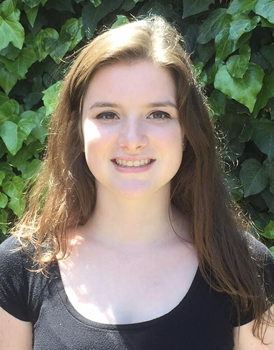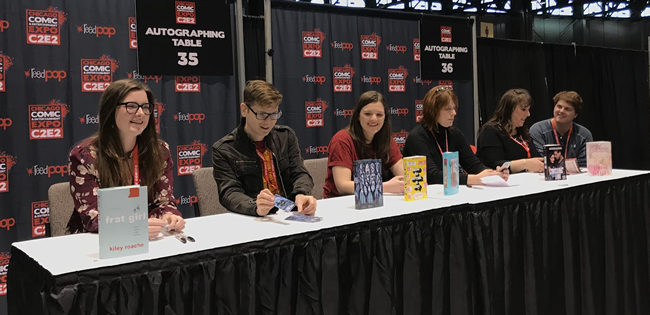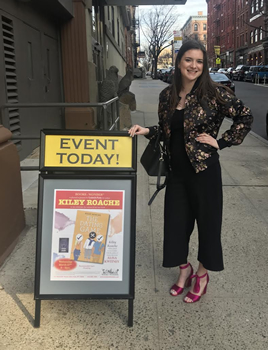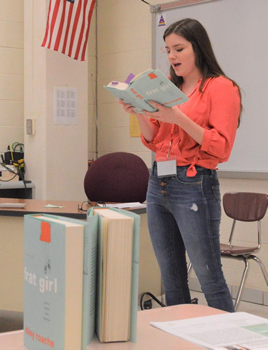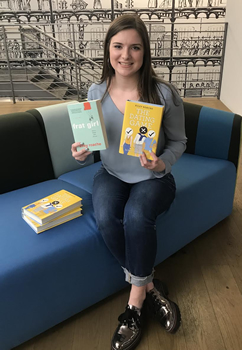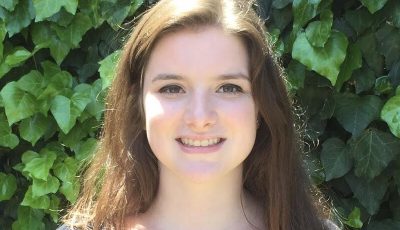

Up Close: Kiley Roache
Creating Killer Content
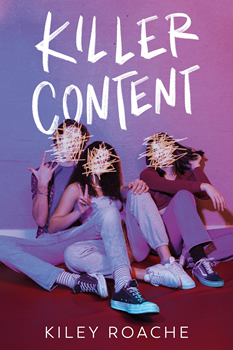 By Dawn Ius
By Dawn Ius
Kiley Roache was just out of high school when she sold her young adult debut, Frat Girl. As a new college student, Roache effectively tapped into themes that still resonate today: misogyny and sexism in post-secondary education. Keeping things teen-relevant, Roache’s sophomore effort, The Dating Game, is the drama of three college students that create a dating app that goes viral—and nets perhaps more than they bargained for.
For her latest release, KILLER CONTENT, Roache explores another current trend with a young adult thriller about six TikTokers who will do anything to create content worthy of their collective 35 million followers.
The teens are a tight-knit group of influencers living together in a beachfront Malibu mansion called the Hype House. It’s all fun and fame, until one of them turns up murdered in their Internet-famous infinity pool. Now the rest of them are suspects.
Each of the girls has a reason to want Sydney Reynolds dead—but only one of them killed her.
In this exclusive interview with The Big Thrill, Roache shares further insight into the plot and characters behind KILLER CONTENT, a page-turner aptly described as One of Us Is Lying meets Knives Out.
Congratulations on the publication of your third novel, KILLER CONTENT. You’ve had such a fascinating publishing journey so far—writing since the 7th grade, agented before you were even out of high school, and your first book published while in college. Did you always know you wanted to be a writer? Can you share some of the details of how you got started?
I don’t think I always knew I wanted to be a writer, like when I was a little kid, I remember wanting to be a marine biologist, and a politician, and a TV reporter… things like that. But what’s interesting is that a lot of these “what I want to be when I grow up” paths were inspired by books I had read or shows I had watched that depicted these careers. So I feel like the love of stories and how they can move you was always there. I started writing in 7th grade, on this very chunky pink laptop, writing thinly-veiled romans à clef about my middle school life. I’d write about 50 pages and then abandon the story as I got stuck and school got busy. I kept doing that again and again with each idea I had. But then in high school, I read The Hunger Games and was absolutely obsessed with it. That inspired me to work on a dystopian project—it was actually a dystopian retelling of Antigone—and with that manuscript, I finished the first draft, went through revisions, and queried agents. I actually signed with my agent based on that writing sample, although we then put it in a drawer to work on other things.
How did publishing your first book change your writing process?
Before publishing my first book, I didn’t really like revising. I loved the exhilaration of coming up with ideas, but then trying to “fix them” during revision led to a sort of spiral of self-loathing. I was mad at myself that I didn’t “get it right” the first time, and wondered if I was making it better or worse. I still revised because I knew I needed to, but it was my least favorite part of the process.
But with my first published book, getting to work with my agent and with amazing editors, I really liked revising the book with their help.
The voice I’d used with myself when revising on my own was sort of mean. I’d say to myself, “This is bad! Fix it!” But editors don’t do that. They say things like: “I was confused about this character’s motivation here, could we draw that out more?” or “This scene was so great but laid the groundwork for XYZ, which we never come back to. Can we explore this more?” They ask great questions which lead to brainstorms which lead back to that sort of exhilaration of putting together the pieces of a story, which I’ve always loved about the first draft.
I realized that when you’re revising, you’re not fixing a broken or bad story, you are still building and creating the story. Or to put succinctly, as the classic phrase goes, “Writing is rewriting.”
KILLER CONTENT has such a great—and timely—premise. Are you part of the TikTok culture? (If so, how do we find you?) Was the novel inspired by a particular TikTok experience, or more of a global perspective on it?
I am on TikTok! On all social media, including TikTok, I’m at @kileyroache. And something I haven’t talked about much publicly yet, but I’m so excited to share now, is that readers can also follow the Lit Lair LA account from the book (Handle @LitLair_La on Instagram and @Lit_Lair_La on TikTok). It’s sort of a fun tie-in to the book, which I hope readers will enjoy.
To answer the second part of your question, the novel wasn’t inspired by any particular real-life event. But I definitely wanted to draw on real-life themes. Even as a more casual user of social media—not an influencer—I’d found that I had a lot of anxiety exacerbated by social media. So with the book, imaging how much more intense those emotions would be for someone with millions of followers, I thought this was a way to dig in to something that so many of us feel—that we are constantly surrounded by “connection” via social media to curated versions of people, but left feeling more and more alone the more time we spend on these apps.
KILLER CONTENT is a fast-paced, entertaining story, but there’s also so much depth. You’ve tackled quite a few issues—mental health, negative body image, violence, the toxicity of social media (just to name a few). What do you hope young readers take away from this novel?
That’s a great question. I’m not sure if there’s a single lesson or “moral of the story” that I hope teens take away from this book. I always think of writing as a conversation with my readers, rather than me teaching them something. After all, I certainly don’t have all the answers on how to exist on social media or in the world; in fact, I often feel like I knew more at 17 then I do at 25. I think teens themselves will have a lot to say about these issues, and if my book helps to promote that conversation, in English class, at a book club, on BookTok, or elsewhere online or offline, well then, that would be something I’d be proud to have written.
There are so many great—and fleshed out—characters in KILLER CONTENT. Who was the easiest to write? The hardest? Is there one that you relate to the most?
They were all fun and challenging to write in their own way. I was probably most surprised that in the end, I loved writing Gwen. For context, while some of the members of the house want to be TikTok famous to promote their other goals—so they can become a professional comedian or singer—Gwen simply wants to be famous. Period. She loves Kim K, she quotes Paris Hilton like a philosopher… to her, fame in itself is the end goal. This could be a character that’s hard to write, if you assume that these desires make her shallow. But actually, digging into what might fuel that desire—what demons are behind an exterior she’s crafted to look like Barbie—Gwen ended up being one of the most interesting characters to write. I started to think about: how much difference is there between unapologetically wanting to be famous (which we scorn) and wanting to be… seen (which is like deeply part of the human condition)? I wrote a line early on where Gwen says something like: What does it mean that strangers love me but the people who know me best have rejected me? Once I figured out this is what kept Gwen up at night, I wanted to keep digging into her POV.
I don’t know if there’s one character I relate to more than the others. There are pieces of each that are pieces of me. For example, Kat’s experience moving to LA and her thoughts about the “idea of California” are not dissimilar to my experience and thoughts when moving from the Midwest to California for college, and I relate to some of Cami’s past body image stressors. And while I do not know how to surf like Beau does, I wish I could, so I think that’s why I wrote that in for him, a bit of wish fulfillment as I wrote part of this book during a Chicago winter. But while each of the characters probably has a piece of me in them, none of them are really based on me. That is part of the fun of writing fiction—getting to spend some time in a character’s head.
Without revealing spoilers, what was the hardest scene in KILLER CONTENT to write?
Yeah, I won’t get into specifics too much because it’s hard to do so without revealing the plot, but obviously anything to do with death, and particularly the death of a 17-year-old, was hard to write.
You know, there are parts of this book, like a lot of murder mysteries, that were sort of scary and campy and fun. But at the end of the day, it’s only a murder mystery because someone is dead. So, there are going to be moments that are just plain sad. Moments that engage with the fact that these five young people who are now murder suspects, were also the housemates, and at least at some point, close friends, of this young woman who tragically died.
Those heavier scenes were the most challenging to write—but also the most rewarding. I found myself crying while writing a few of the scenes, which is not something that I’ve experienced before with my writing.
I read that often you write to playlists—what were some of the songs on the playlist while writing KILLER CONTENT?
Yes! I love to write to playlists. I make a playlist for each book I write, and then I often make sub-playlists for certain characters, scenes, or sub-plots. The general playlist for this book included songs about the idea of fame, California, and Hollywood, as well as songs about murder.
Some examples include: “When I Grow Up” by the Pussycat Dolls, “No Body, No Crime” by Taylor Swift, “California Dreamin’” by the Mamas and the Papas, “Jealousy, Jealousy” by Olivia Rodrigo, “We Both Reached for the Gun,” “Cell Block Tango” and “Roxie” from the musical Chicago, “Beverly Hills” by Weezer, “Creep” by Radiohead (as well as like three covers of this song because what sums up the desire to be seen and known via social media than the line “I want a perfect body/ I want a perfect soul”?) and of course, “California Gurls” by Katy Perry.
In addition to having three published novels, you’re an accomplished journalist. How would you say the two disciplines complement each other?
There’s a lot of crossover in the skills you build. Writing clearly and concisely helps whether you’re writing an article about stock prices or a murder mystery. I was fortunate to learn from great editors and writers at publications ranging from Huffington Post Teen when I was 16 to more recently at The Wall Street Journal, Reuters, and Bloomberg.
Journalism taught me how to focus—how to boil down the core of what I was writing to a headline or a lede paragraph. This is helpful in fiction, because it helps me to figure out the north star I am writing toward. Journalism also taught me how to be purposefully curious, how to take a random question I’m musing on and brainstorm, and flesh out, and develop, instead of just letting it float by.
The Big Thrill is as much for aspiring writers as it is for readers—what is the one piece of writing advice you feel has been invaluable?
This is classic but: read. When I first started writing, in middle school, I read Stephen King’s On Writing. I would definitely recommend this book to anyone who wants to start writing. He doesn’t give any sort of formula or paint-by-numbers instruction. Instead he talks a lot about the experience of writing, including the emotions around it. He doesn’t say “have x happen on y page,” but instead he says things like: draft to the end of the first draft and then put it in a drawer for six weeks. When you come back to it, you’ll have enough distance to be able to see what works and doesn’t. This was so helpful for me when I was starting out. But perhaps the most important piece of advice he has is to make sure you’re reading—read the genre you want to write, read other genres to learn story craft, read to remember why you love stories, just read, read, read.
This is great homework to get, because if you’re a writer, you’re also probably a reader. Personally, I love to be staying up too late caught up in a mystery and think, “I’m technically being productive right now.”
What can you share about what you’re working on next?
I’m working on another young adult thriller, and I’m excited to share the details of that in the future! Since I’m a big reviser, I don’t usually share much about a story until I’m done with it, simply because a lot about it often changes in the process.
- On the Cover: Alisa Lynn Valdés - March 31, 2023
- On the Cover: Melissa Cassera - March 31, 2023
- Behind the Scenes: From Book to Netflix - March 31, 2023

